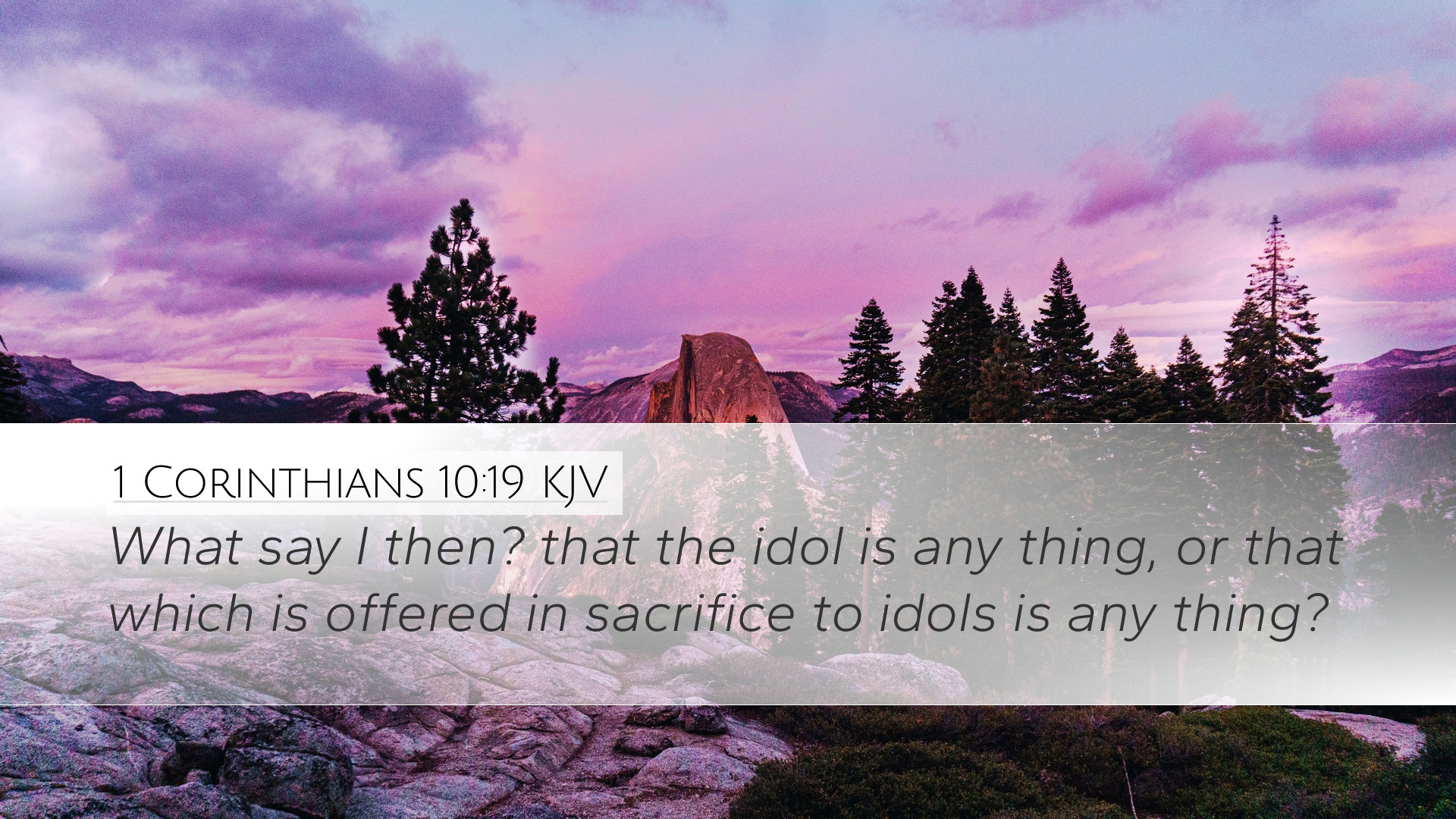Commentary on 1 Corinthians 10:19
The verse 1 Corinthians 10:19 states:
"What do I mean then? That an idol is anything, or that which is offered in sacrifice to idols is anything?"
This verse is embedded within a rich tapestry of Paul’s teachings on Christian liberty and the nature of idolatry.
It serves as a pivotal point where Paul addresses the concerns of the Corinthians regarding participation in idol worship.
Contextual Analysis
In the broader context of 1 Corinthians 10, Paul discusses the implications of idol worship and the dangers
it poses to the believer’s faith. He aligns the actions of the Corinthians with those of the Israelites, examining
how they exposed themselves to the spiritual consequences of idolatry.
Insights from Public Domain Commentaries
Matthew Henry's Commentary
Matthew Henry elucidates that this verse challenges the notion that idols possess any real power or substance.
He argues that the existence of idols is a mere deception; they are not divine. He further emphasizes that the sacrifices
offered to idols do not bear any weight or influence over the true worshipers of God. His commentary reflects on how
engaging with idol worship can lead to spiritual compromise for Christians, cautioning believers to recognize the
emptiness of idol offerings.
Albert Barnes' Notes
Albert Barnes provides a more analytical approach, asking rhetorical questions to stimulate critical reflection among
the faithful. He points out that Paul’s inquiry aims to debunk the Corinthians’ confusion regarding the value or
significance of idols. Barnes posits that the real question lies in the heart of the believer, emphasizing that an
idol, while perhaps revered by many, is essentially futile and powerless. He suggests that anything that draws
believers away from God is to be avoided, thus reiterating the importance of discernment in a world that celebrates
idolatry.
Adam Clarke's Commentary
Adam Clarke expands on Paul’s thought process, indicating that the question posed serves to refute both the integrity
of those who worship idols and the validity of the practices surrounding them. Clarke elaborates that idols and
their offerings are to be regarded as nothing, underscoring the theological implication that only God deserves
genuine veneration. He further highlights Paul’s purpose in creating an understanding of the implications of
participation in idol worship, urging believers to be mindful and to prioritize their relationship with Christ above
that of empty religious rituals.
Theological Implications
The discussion surrounding 1 Corinthians 10:19 provides a profound insight into the early Church’s
struggles with syncretism—where true worship was often conflated with pagan practices. Christians today are
likewise challenged by the contemporary forms of idolatry that may not be represented by physical idols but could
be manifested in materialism, self-worship, or societal pressures. Each commentary underscores that Paul’s message is
timeless and continues to resonate with modern believers.
Practical Applications for Today’s Believers
- Embrace Identity in Christ: Recognizing that true identity is found in Christ and not in worldly symbols or practices.
- Avoid Compromise: Be vigilant against actions and affiliations that can lead one astray from true worship.
- Engage in Discernment: Regularly evaluate life choices and relationships to ensure they align with biblical truths.
- Cultivate Genuine Worship: Prioritize heart-centered worship that seeks the Spirit of God above all else.
Conclusion
In summation, 1 Corinthians 10:19 challenges not only the Corinthian church but all believers to
recognize the futility of idols and the significance of preserving one’s spiritual integrity. Through the insights
provided by esteemed commentators such as Matthew Henry, Albert Barnes, and Adam Clarke, contemporary believers are
encouraged to engage in mindful worship that honors God, rejects idols, and builds a genuine relationship with
Christ.


